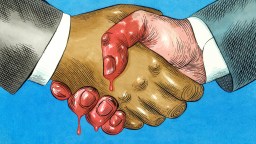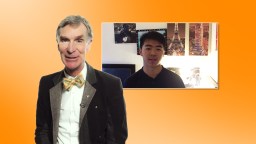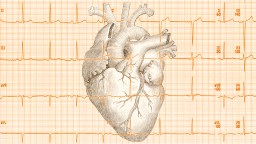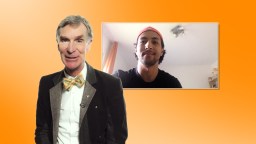All Videos
All Stories
Journalist Jelani Cobb considers the impact of Obama’s presidency on race in America. Did he make good on the promise of change that got him elected?
▸
6 min
—
with
The happiest moments of our lives are when we lose ourselves – in art, in exercise, in love. According to Harvard’s Diane Paulus, being able to ‘play’ and engage in something outside of ourselves is a valuable respite from our egos.
▸
4 min
—
with
Columbia professor Tim Wu came to the Big Think studio to talk about clickbait. What happened next will shock you.
▸
5 min
—
with
Farewell Moon, we barely knew you. Bill Nye knows the Moon is moving away from Earth 1.48 inches per year. Will it keep drifting further away, and what happens to Earth when it does?
▸
2 min
—
with
Slovenian philosopher Slavoj Žižek thinks the U.S. political machinery is truly broken. He guides a verbal tour through the failure of manufactured consent, the appeal of human baseness, and politics as a real struggle of life and death.
▸
8 min
—
with
Physicists’ ideas about the nature and existence of time may seem incongruent with our experience of it, but author James Gleick makes a case for why we need to keep an open mind.
▸
4 min
—
with
American painter David Salle explains that to observe and appreciate art better, we need to refresh a basic skill we’ve all left in the dust: how to see.
▸
10 min
—
with
Kimo Kippen is the Former Chief Learning Officer for Hilton Worldwide. What’s his view on Airbnb? He sums it up in one word: excited.
▸
8 min
—
with
What if you found out your disaster relief donation did more harm than good? Juanita Rilling explains the humanitarian logistics of unwanted donations, and how you can give in a more informed way.
▸
5 min
—
with
Bitcoin will bring a seismic shift in global finance, says Toni Lane Casserly: “If you are an institution with integrity, generally I would say you don’t have anything to worry about.” … So long to the world as we know it.
▸
10 min
—
with
Bill Nye is always dressed for a party, but this time his celestial bow-tie pays respect to one of our era’s greatest discoveries: gravitational waves.
▸
4 min
—
with
Anthony Scaramucci is no angel, but he does choose his words carefully. If you don’t evolve along with language, it can be catastrophic for businesses and team dynamics.
▸
3 min
—
with
Through an incredible anecdote, Earl Lewis demonstrates why STEM can’t do it alone. Scientists and humanists needs each other, and institutions have a responsibility to continue to fund and nurture the humanities.
▸
6 min
—
with
If Donald Trump’s political strategies look familiar, says Tim Wu, it’s because we’ve seen them before. Where? In the totalitarian regimes of China, North Korea, and Germany.
▸
3 min
—
with
Theaters today seem like hallowed ground, says Harvard’s Diane Paulus, but that’s not their natural state. Once, they had the same atmosphere as sport: visceral, alive, and indebted to its audience. How can we get back there?
▸
10 min
—
with
What happens when Shakespeare goes to prison? His works humanize prisoners and open them up to reform in a way that the prison system fails to, says author Margaret Atwood.
▸
8 min
—
with
“My Experience is What I Agree to Pay Attention to,” said psychologist William James. And therein lies the problem and danger of advertising: we don’t always agree or choose to pay attention, but it shapes our life experience irrevocably.
▸
9 min
—
with
Why are we the way that we are – is it nature or nurture? This week, Bill Nye answers a question from Evan, who is having a science argument with his mom.
▸
2 min
—
with
How can we chart moral progress? One popular narrative holds that it increases steadily, rising over time. But Jelani Cobb argues it happens in fits and starts, like an EKG line that spikes and falls.
▸
11 min
—
with
Vampires were considered an actual danger in 18th century eastern Europe, but how did the myth come about? Science researcher Kathleen McAuliffe sheds new light on a famously murky legend.
▸
4 min
—
with
Your brain isn’t the only organ processing your day while you sleep. Dr. Emeran Mayer explains the circular processing of emotion and memory that goes on between your brain and your digestive system, and how the latter can “dream”.
▸
6 min
—
with
Visionaries know why they get out of bed each day. Do you? Ethnographer and leadership expert Simon Sinek explains how to find direction and fulfillment in your personal and professional life.
▸
5 min
—
with
Whatever you do, don’t look behind you – because the answer isn’t there, says psychologist Alison Gopnik. The real ghosts are glitches in your brain, and in a way, that’s even scarier.
▸
3 min
—
with
A powerful scientific method of observation has helped scientists understand the brain. That method closely parallels Nobel Prize-winner Eric Kandel’s journey to make his most famous discoveries.
▸
7 min
—
with
Could we use computers to translate animal communication into human language? If so, what would we learn? And might it unlock a new understanding of existence and our place in the cosmos?
▸
6 min
—
with
Standardized testing is like bringing a knife to a gun fight. It’s not totally useless, but it does misunderstand the situation. The Imagination Institute’s Scott Barry Kaufman suggests a more three-dimensional search for intelligence.
▸
5 min
—
with
Why does Jim Gaffigan tell clean jokes? Jesus Christ told him to, obviously. The real reason, which Gaffigan explains here, takes him through the history of comedy and satire in American.
▸
6 min
—
with
If you want to know what separates animals from humans, look no further than this meditation on life from American novelist T.C. Boyle. The author says nature obsesses him and renews him.
▸
9 min
—
with
Nobel Laureate and Columbia professor Dr Eric Kandel discusses the nature of good and evil via the Trump candidacy, and his own devastating childhood experiences in Austria.
▸
6 min
—
with
Neuroscientists now think of the gut as a “second brain”; it independently controls your digestive processes and is in constant conversation with your main brain. What do they talk about? Depression, theorizes Dr Emeran Mayer.
▸
8 min
—
with





























